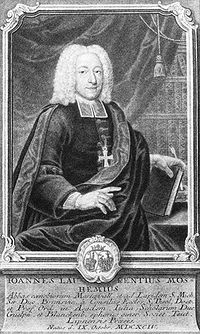
Johann Lorenz von Mosheim
Encyclopedia

Lutheranism
Lutheranism is a major branch of Western Christianity that identifies with the theology of Martin Luther, a German reformer. Luther's efforts to reform the theology and practice of the church launched the Protestant Reformation...
church historian, was born at Lübeck
Lübeck
The Hanseatic City of Lübeck is the second-largest city in Schleswig-Holstein, in northern Germany, and one of the major ports of Germany. It was for several centuries the "capital" of the Hanseatic League and, because of its Brick Gothic architectural heritage, is listed by UNESCO as a World...
on 9 October 1693 or 1694.
Biography
After studying at the gymnasiumGymnasium (school)
A gymnasium is a type of school providing secondary education in some parts of Europe, comparable to English grammar schools or sixth form colleges and U.S. college preparatory high schools. The word γυμνάσιον was used in Ancient Greece, meaning a locality for both physical and intellectual...
of his native place, he entered the University of Kiel
University of Kiel
The University of Kiel is a university in the city of Kiel, Germany. It was founded in 1665 as the Academia Holsatorum Chiloniensis by Christian Albert, Duke of Holstein-Gottorp and has approximately 23,000 students today...
(1716), where he took his master's degree in 1718. In 1719 he became assessor in the philosophical faculty at Kiel
Kiel
Kiel is the capital and most populous city in the northern German state of Schleswig-Holstein, with a population of 238,049 .Kiel is approximately north of Hamburg. Due to its geographic location in the north of Germany, the southeast of the Jutland peninsula, and the southwestern shore of the...
.
His first appearance in the field of literature was in a polemical tract against John Toland
John Toland
John Toland was a rationalist philosopher and freethinker, and occasional satirist, who wrote numerous books and pamphlets on political philosophy and philosophy of religion, which are early expressions of the philosophy of the Age of Enlightenment...
, Vindiciae antiquae christianorum disciplinae (1720), which was soon followed by a volume of Observationes sacrae (1721). These works, along with the reputation he had acquired as a lecturer and preacher, secured for him a call to the University of Helmstedt
University of Helmstedt
The University of Helmstedt, official Latin name: Academia Julia , was a university in Helmstedt in the Duchy of Brunswick-Wolfenbüttel that existed from 1576 until 1810....
as professor ordinarius in 1723. The Institutionum historiae ecclesiasticae libri IV appeared in 1726, and in the same year he was appointed by the duke of Brunswick abbot of Marienthal, to which dignity and emolument the abbacy of Michaelstein
Michaelstein Abbey
Michaelstein Abbey is a former Cistercian monastery, now the home of the Stiftung Kloster Michaelstein - Musikinstitut für Aufführungspraxis , near the town of Blankenburg in the Harz in Sachsen-Anhalt, Germany.-History:In a deed of Emperor Otto I dated 956 giving property to...
was added in the following year.
Mosheim was much consulted by the authorities when the new University of Göttingen was being formed, especially in the framing of the statutes of the theological faculty, and the provisions for making the theologians independent of the ecclesiastical courts. In 1747 he was made chancellor of the university. In 1748 he was responsible for the visit made by George II of Great Britain
George II of Great Britain
George II was King of Great Britain and Ireland, Duke of Brunswick-Lüneburg and Archtreasurer and Prince-elector of the Holy Roman Empire from 11 June 1727 until his death.George was the last British monarch born outside Great Britain. He was born and brought up in Northern Germany...
to his university. He died at Göttingen on September 9, 1755.
Works
Among his other works were De rebus christianorum ante Constantinum commentarii (1753), Ketzer-Geschichte (2nd ed. 1748), and Sittenlehre der heiligen Schrift (x7~553). His exegetical writings, characterized by learning and good sense, include Cogitationes in N. T. bc. select. (1726), and expositions of I CorinthiansFirst Epistle to the Corinthians
The first epistle of Paul the apostle to the Corinthians, often referred to as First Corinthians , is the seventh book of the New Testament of the Bible...
(1741) and the two Epistles to Timothy
First Epistle to Timothy
The First Epistle of Paul to Timothy, usually referred to simply as First Timothy and often written 1 Timothy, is one of three letters in the New Testament of the Bible often grouped together as the Pastoral Epistles, the others being Second Timothy and Titus...
(1755). In his sermons (Heilige Reden) considerable eloquence is shown, and a mastery of style which justifies the position he held as president of the German Society.
There are two English versions of the Institutes, that of Archibald Maclaine, published in 1764, and that of James Murdock (1832), which is the more correct. Murdock's translation was revised and re-edited by James Seaton Reid
James Seaton Reid
-Life:Born in Lurgan, County Armagh, he was son of Forest Reid, master of a grammar school there, and Mary Weir, his wife. Left fatherless at an early age, James spent much of his youth at Ramelton, County Donegal, under the care of his brother Edward, minister of the presbyterian congregation...
in 1848, and by H. L. Hastings in 1892 (Boston), An English translation of the De rebus christianorum was published by Murdock in 1851.
See also
- Great Apostasy
Mosheim is also credited with writing "An Ecclesiastical History, From The Birth of Christ to the Beginning of the Eighteenth Century: in which The Rise, Progress And Variation of Church Power Are Considered In Their Connection With the State Of Learning And Philosophy, and The Political History of Europe During that Period." It is a two volume set, translated from Latin by Archibald Maclaine, D.D., published in London in 1842 by William Tyler, Bolt-Court London. The title page lists the author as John Lawrence Mosheim, D.D., Chancellor of the University of Göttingen.

